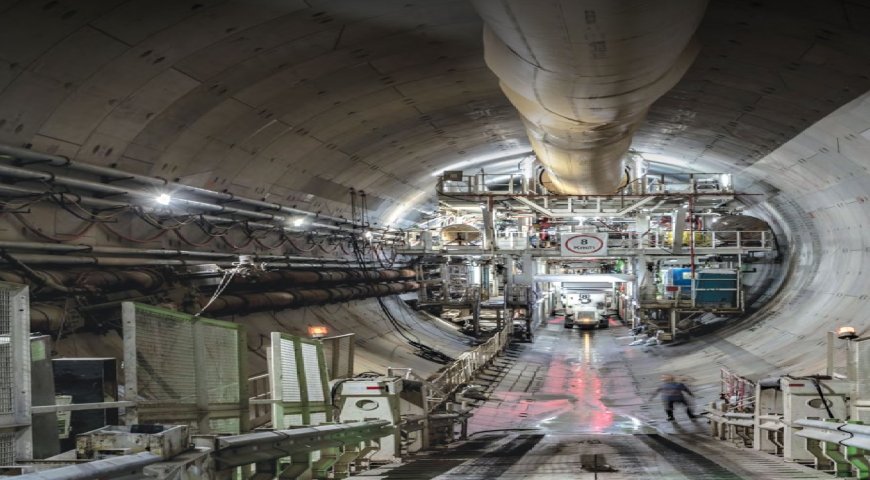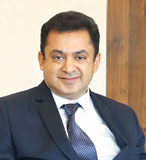Engineering the Underground
A Closer Look at the Machinery Powering India’s Metro Growth The towering cranes, colossal tunnel boring machines, and intricate formwork systems have become the unsung heroes of metro construction. These engineering marvels exemplify the marriage of technology and innovation, transforming

A Closer Look at the Machinery Powering India’s Metro Growth
The towering cranes, colossal tunnel boring machines, and intricate formwork systems have become the unsung heroes of metro construction. These engineering marvels exemplify the marriage of technology and innovation, transforming the vision of connectivity into tangible reality.
Equipment Times looks into the different Tunnel Boring Machines (TBM) models and other equipment, notable tunneling projects, latest technological advancements, high operational efficiency and minimize downtime, training for operators and maintenance personnel and spare parts availability.
he Indian market for metro construction equipment was experiencing significant growth due to the rapid expansion of metro rail systems across various cities in India. Metro rail projects were being implemented in cities like Delhi, Mumbai, Chennai, Kolkata, Bangalore, Hyderabad, and more, in order to address urban congestion, provide efficient transportation, and reduce pollution.
The demand for metro construction equipment in India was being driven by the need for tunnel boring machines, earthmoving equipment, concrete batching plants, cranes, piling rigs, and various other specialized machinery required for tunneling, excavation, concrete pouring, and track laying.
The Indian government’s focus on infrastructure development, coupled with urbanization and population growth, had led to substantial investments in metro rail projects. This, in turn, had created opportunities for both domestic and international manufacturers and suppliers of construction equipment to cater to the market’s demands.
As India’s urban landscape evolves to accommodate the burgeoning population, one of the most remarkable infrastructural transformations taking place is the rapid expansion of metro networks across major cities. This modern and efficient mode of transportation not only eases traffic congestion but also significantly reduces the carbon footprint. At the heart of this revolution lies an array of cutting-edge equipment, each with its own role to play in the construction of these subterranean marvels.
The towering cranes, colossal tunnel boring machines, and intricate formwork systems have become the unsung heroes of metro construction. These engineering marvels exemplify the marriage of technology and innovation, transforming the vision of connectivity into tangible reality.
Tunnel Boring Machines (TBMs)
Imagine a colossal mechanical worm carving its way through the earth, and you’ll have an apt description of the Tunnel Boring Machines. These mammoth machines are at the forefront of metro construction, silently burrowing through soil and rock to create tunnels that form the veins of the metro network. Equipped with state-of-the-art cutters and drills, TBMs ensure precision while minimizing disturbances to the surface above. With diameters ranging from 6 to 17 meters, these technological giants can excavate kilometers of tunnels in a remarkably short time.
Concrete Spraying Robots
Venturing into the confined spaces of a metro tunnel can be a challenge, but technology has an answer to that as well. Concrete spraying robots are agile and nimble, allowing construction crews to apply a thick layer of concrete to tunnel walls, providing structural integrity while minimizing the need for human labor in hazardous conditions. These robots boast impressive maneuverability, reaching even the tightest corners of a tunnel, and they ensure a consistent layer of concrete, contributing to the safety and longevity of the metro network.
Segment Erectors
Metro tunnels are often constructed using precast concrete segments that form a complete ring when assembled. This is where segment erectors come into play. These machines efficiently place these segments in perfect alignment, forming the tunnel walls. Their precision and speed ensure that the tunnel is constructed with accuracy, meeting the highest safety standards.
Formwork Systems
When it comes to constructing underground stations and other structures, formwork systems are indispensable. These systems are modular frameworks that mold concrete into the desired shape. As metro stations are not just functional spaces but also architectural landmarks, formwork systems play a crucial role in shaping the aesthetics of the stations. Their flexibility and reusability make them an eco-friendly choice, optimizing resource utilization.
Construction Cranes
Above the ground, construction cranes tower over the metro sites, orchestrating the intricate dance of heavy materials. These cranes hoist and place massive concrete segments, steel reinforcements, and other building materials with precision. Their significance lies in their ability to lift and maneuver heavy loads with finesse, ensuring the seamless assembly of structures.
As India’s metro network continues to expand, these remarkable equipment pieces will remain at the heart of every construction site. They embody the spirit of innovation and determination, carving out pathways beneath our bustling cities. From the mammoth TBMs that tunnel through bedrock to the intricate formwork systems shaping grand stations, these machines are writing a new chapter in India’s infrastructural evolution, making connectivity efficient, sustainable, and awe-inspiring.
In the grand scheme of metro construction, the equipment is not merely tools; they are the hands that shape the future, one tunnel, one station, and one connection at a time.
Tunnel Boring Machines…
The market for tunnel boring machines (TBMs) was showing growth potential due to the increasing number of metro rail, road, and other infrastructure projects that required tunneling. TBMs are specialized equipment used for excavating tunnels in various types of ground conditions, ranging from soft soils to hard rock.
Metro Rail Projects: The expansion of metro rail networks in Indian cities was a significant driver for the demand for TBMs. Many cities were investing in metro systems to alleviate traffic congestion and provide efficient public transportation.
Urbanization and Infrastructure: Rapid urbanization and the need for improved infrastructure were leading to more tunneling projects, not only in metros but also in roadways, water supply, and sewage systems.
Competition and Collaboration: Several international TBM manufacturers were active in the Indian market, often collaborating with local partners. This collaboration helped in adapting the technology to local conditions and in complying with procurement regulations.
Challenges: The Indian market presented challenges such as regulatory hurdles, land acquisition issues, and varying ground conditions that influenced the selection & operation of TBMs.
The Metro in 1970s
Metro Rail started in the early 1970s and the first Metro Rail stretch was commissioned in the Kolkata city in 1984 between Esplanade and Bhowanipur, covering a distance of 3.40 km with five stations under Metro Railway, Kolkata. At Present, 27 cities have either Operational or Under Construction Network.
City-Wise Indicators
Around 810 km of metro lines are operational in 20 cities across the nation. More than 980 km of the metro network are currently under construction in 27 cities, according to Union Minister for Housing and Urban Affairs Hardeep Puri.
The Delhi Metro which completed 20 years of its operation on 25 December 2022 is the largest operational network in the country. The metro spans a length of 349 kms with 254 stations spread across 10 lines.
The second largest operational network is Hyderabad Metro which comes a distant second with a length of 69 km followed by 56 km in Bengaluru, 54 km in Chennai and 44 km In Mumbai (once line 2A and 7 are opened).
Industry speaks…
 |
Dr. Sanjay Mukherjee, IAS. Metropolitan Commissioner, MMRDA, said, “The two new metro lines in Mumbai have received a tremendous response from the city’s residents. Every day, approximately 250,000 commuters choose to travel via the metro, resulting in a significant reduction in congestion on the major roads of Mumbai. These metro lines have successfully reduced travel time, providing relief to Mumbaikars, especially those who use the Western Express Highway. The metro rakes, manufactured as part of the ‘Make in India’ initiative, are both environmentally friendly and equipped with air conditioning. They are reasonably priced, offering passengers a comfortable and efficient ride. Additionally, these two metro lines provide direct connectivity to Mumbai’s northern suburbs, helping to alleviate traffic congestion on the Western Express Highway. As a result, commuters are increasingly opting for the Mumbai Metro over dealing with traffic.” |
 |
Gulshan Gill, Managing Director, Terratec India, said, “Terratec has supplied more than 45 tunnel boring machines (TBMs) for various tunnel projects across India that have utilized TBM technology. Some notable examples include DMRC Phase-III, Mumbai Metro Line 3, Ahmadabad Metro, Lucknow Metro, Amar Mahal Water Project, Priority Sewerage Project, Pune Metro, Kanpur Metro, and many others. Currently, TATA projects in Chennai are utilizing five Terratec TBMs for package TU01 of Chennai Metro’s second phase of construction. These TBMs have been publicly recognized for their exceptional performance and timely completion in the challenging geological conditions of Chennai. On the smaller diameter front, our smallest EPB TBM is making remarkable progress in Mumbai. The 3.14 EPB TBM, operated by JK-Michigan JV, has achieved an average monthly progress of 370m so far in the ongoing Mithi River project.” |
 |
Umesh Srivastava, Director, Robbins Tunneling & Trenchless Technology (I), said, “We are here to create Tunnel Boring Machines (TBMs) that are a perfect match for each project’s needs. We understand that soil and rock conditions can vary widely, so we’ve developed specialized TBMs for different situations. Whether the ground is soft like mud or tough like rock, we have a TBM designed to handle it. Our team closely collaborates with project leaders to recommend the right TBM model or even customize one to fit the task precisely. Moreover, we offer technical support that enhances the TBM’s performance in challenging scenarios. This combination of tailor-made machinery and advanced technology reflects our strong commitment to ensuring project success, regardless of the complexities involved.” |
 |
V.G. Sakthikumar, Chairman & Managing Director, Schwing Stetter India, said, “Our machines have been heavily involved in many metro projects across the country as more and more metro projects are being sanctioned. The Chennai metro’s ongoing metro construction has been powered by earthmoving and heavy equipment from Schwing – XCMG. Our excavators have also been involved in the Pune, Mumbai, Kolkata, Bangalore and the Delhi Metro as well. Schwing-XCMG is committed to continue to innovate and deliver excellence in our excavator products. We are working on or planning to work on introducing more electric models in different tonnage classes, incorporating artificial intelligence and machine learning into our smart system, enhancing the user interface and user experience of our products, and expanding our product portfolio to include more specialized applications.” |
 |
Satendra Tiwari, Head of Manufacturing – Pithampur, CASE Construction Equipment, said, “CASE Construction Equipment’s machines are engineered to effectively address the intricate challenges encountered in various construction sites. Rock stability, groundwater management, and seismic concerns are paramount in tunnelling projects. Our equipment ensures rock stability with intelligent technologies, handles groundwater ingress, and maintains safe operations in seismically active regions. In equipment procurement, we offer a balanced approach. Our CX220C and CX220C LC Crawler Excavators, powered by the reliable FPT “NEF 6” Series Industrial engine and equipped with the CASE Intelligent Hydraulic System (CIHS), excel in tough terrains with high productivity and low fuel consumption. The L-series Crawler Dozers like the 1150L and 1650L provide power and efficiency for varied applications. Our commitment lies in tackling challenges and delivering solutions that enhance efficiency, safety, and productivity in the demanding world of metro construction.” |
 |
Rakesh Modi, Chairman, Mtandt Group, said, “Our Boom Lifts have played an instrumental role in several prominent tunnelling projects across India. These encompass vital infrastructure undertakings such as the Delhi Metro, Mumbai Metro, and Chennai Metro. Our advanced equipment has proven indispensable in these projects for facilitating secure and efficient construction and maintenance activities within challenging tunnel environments.” |
Hits: 21








